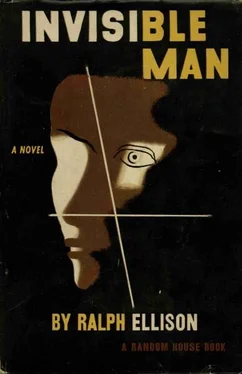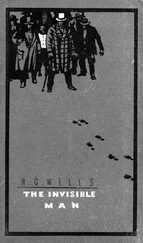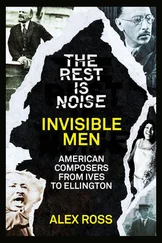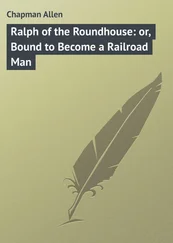Ralph Ellison - Invisible man
Здесь есть возможность читать онлайн «Ralph Ellison - Invisible man» весь текст электронной книги совершенно бесплатно (целиком полную версию без сокращений). В некоторых случаях можно слушать аудио, скачать через торрент в формате fb2 и присутствует краткое содержание. Год выпуска: 1995, ISBN: 1995, Издательство: Vintage Books, Жанр: Классическая проза, на английском языке. Описание произведения, (предисловие) а так же отзывы посетителей доступны на портале библиотеки ЛибКат.
- Название:Invisible man
- Автор:
- Издательство:Vintage Books
- Жанр:
- Год:1995
- ISBN:9780679732761
- Рейтинг книги:4 / 5. Голосов: 1
-
Избранное:Добавить в избранное
- Отзывы:
-
Ваша оценка:
- 80
- 1
- 2
- 3
- 4
- 5
Invisible man: краткое содержание, описание и аннотация
Предлагаем к чтению аннотацию, описание, краткое содержание или предисловие (зависит от того, что написал сам автор книги «Invisible man»). Если вы не нашли необходимую информацию о книге — напишите в комментариях, мы постараемся отыскать её.
The Waste Land,
Invisible man — читать онлайн бесплатно полную книгу (весь текст) целиком
Ниже представлен текст книги, разбитый по страницам. Система сохранения места последней прочитанной страницы, позволяет с удобством читать онлайн бесплатно книгу «Invisible man», без необходимости каждый раз заново искать на чём Вы остановились. Поставьте закладку, и сможете в любой момент перейти на страницу, на которой закончили чтение.
Интервал:
Закладка:
We had come to stand near the piano now, where an intense young man questioned me about various leaders of the Harlem community. I knew them only by name, but pretended that I knew them all.
"Good," he said, "good, we have to work with all these forces during the coming period."
"Yes, you're quite right," I said, giving my glass a tinkling twirl. A short broad man saw me and waved the others to a halt. "Say, Brother," he called. "Hold the music, boys, hold it!"
"Yes, uh ... Brother," I said.
"You're just who we need. We been looking for you."
"Oh," I said.
"How about a spiritual, Brother? Or one of those real good ole Negro work songs? Like this: Ah went to Atlanta -- nevah been there befo'," he sang, his arms held out from his body like a penguin's wings, glass in one hand, cigar in the other. "White man sleep in a feather bed, Nigguh sleep on the flo' ... Ha! Ha! How about it, Brother?"
"The Brother does not sing!" Brother Jack roared staccato.
"Nonsense, all colored people sing."
"This is an outrageous example of unconscious racial chauvinism!" Jack said.
"Nonsense, I like their singing," the broad man said doggedly.
"The Brother does not sing!" Brother Jack cried, his face turning a deep purple.
The broad man regarded him stubbornly. "Why don't you let him say whether he can sing or not ... ? Come on, Brother, git hot! Go Down, Moses," he bellowed in a ragged baritone, putting down his cigar and snapping his fingers. "Way down in Egypt's land. Tell dat ole Pharaoh to let ma colored folks sing! I'm for the rights of the colored brother to sing!" he shouted belligerently.
Brother Jack looked as if he would choke; he raised his hand, signaling. I saw two men shoot from across the room and lead the short man roughly away. Brother Jack followed them as they disappeared beyond the door, leaving an enormous silence.
For a moment I stood there, my eyes riveted upon the door, then I turned, the glass hot in my hand, my face feeling as though it would explode. Why was everyone staring at me as though I were responsible? Why the hell were they staring at me? Suddenly I yelled, "What's the matter with you? Haven't you ever seen a drunk --" when somewhere off the foyer the broad man's voice staggered drunkenly to us, "St. Louis mammieeeee -- with her diamond riiiings ..." and was clipped off by a slamming door, leaving a roomful of bewildered faces. And suddenly I was laughing hysterically.
"He hit me in the face," I wheezed. "He hit me in the face with a yard of chitterlings!" -- bending double, roaring, the whole room seeming to dance up and down with each rapid eruption of laughter.
"He threw a hog maw," I cried, but no one seemed to understand. My eyes filled, I could barely see. "He's high as a Georgia pine," I laughed, turning to the group nearest me. "He's abso-lutely drunk ... off music!"
"Yes. Sure," a man said nervously. "Ha, ha ..."
"Three sheets in the wind," I laughed, getting my breath now, and discovering that the silent tension of the others was ebbing into a ripple of laughter that sounded throughout the room, growing swiftly to a roar, a laugh of all dimensions, intensities and intonations. Everyone was joining in. The room fairly bounced.
"And did you see Brother Jack's face," a man shouted, shaking his head.
"It was murder!"
"Go down Moses!"
"I tell you it was murder!"
Across the room they were pounding someone on the back to keep him from choking. Handkerchiefs appeared, there was much honking of noses, wiping of eyes. A glass crashed to the floor, a chair was overturned. I fought against the painful laughter, and as I calmed I saw them looking at me with a sort of embarrassed gratitude. It was sobering and yet they seemed bent upon pretending that nothing unusual had happened. They smiled. Several seemed about to come over and pound my back, shake my hand. It was as though I had told them something which they'd wished very much to hear, had rendered them an important service which I couldn't understand. But there it was, working in their faces. My stomach ached. I wanted to leave, to get their eyes off me. Then a thin little woman came over and grasped my hand.
"I'm so sorry that this had to happen," she said in a slow Yankee voice, "really and truly sorry. Some of our Brothers aren't so highly developed, you know. Although they mean very well. You must allow me to apologize for him ..."
"Oh, he was only tipsy," I said, looking into her thin, New England face.
"Yes, I know, and revealingly so. I would never ask our colored brothers to sing, even though I love to hear them. Because I know that it would be a very backward thing. You are here to fight along with us, not to entertain. I think you understand me, don't you, Brother?"
I gave her a silent smile.
"Of course you do. I must go now, good-bye," she said, extending her little white-gloved hand and leaving.
I was puzzled. Just what did she mean? Was it that she understood that we resented having others think that we were all entertainers and natural singers? But now after the mutual laughter something disturbed me: Shouldn't there be some way for us to be asked to sing? Shouldn't the short man have the right to make a mistake without his motives being considered consciously or unconsciously malicious? After all, he was singing, or trying to. What if I asked him to sing? I watched the little woman, dressed in black like a missionary, winding her way through the crowd. What on earth was she doing here? What part did she play? Well, whatever she meant, she's nice and I like her.
Just then Emma came up and challenged me to dance and I led her toward the floor as the piano played, thinking of the vet's prediction and drawing her to me as though I danced with such as her every evening. For having committed myself, I felt that I could never allow myself to show surprise or upset -- even when confronted with situations furthest from my experience. Otherwise I might be considered undependable, or unworthy. I felt that somehow they expected me to perform even those tasks for which nothing in my experience -- except perhaps my imagination -- had prepared me. Still it was nothing new, white folks seemed always to expect you to know those things which they'd done everything they could think of to prevent you from knowing. The thing to do was to be prepared -- as my grandfather had been when it was demanded that he quote the entire United States Constitution as a test of his fitness to vote. He had confounded them all by passing the test, although they still refused him the ballot ... Anyway, these were different.
It was close to five A.M., many dances and many bourbons later, when I reached Mary's. Somehow, I felt surprised that the room was still the same -- except that Mary had changed the bed linen. Good old Mary. I felt sadly sobered. And as I undressed I saw my outworn clothes and realized that I'd have to shed them. Certainly it was time. Even my hat would go; its green was sun-faded and brown, like a leaf struck by the winter's snows. I would require a new one for my new name. A black broad-brimmed one; perhaps a homburg ... humbug? I laughed. Well, I could leave packing for tomorrow -- I had very little, which was perhaps all to the good. I would travel light, far and fast. They were fast people, all right. What a vast difference between Mary and those for whom I was leaving her. And why should it be this way, that the very job which might make it possible for me to do some of the things which she expected of me required that I leave her? What kind of room would Brother Jack select for me and why wasn't I left to select my own? It didn't seem right that in order to become a Harlem Leader I should live elsewhere. Yet nothing seemed right and I would have to rely upon their judgment. They seemed expert in such matters.
Читать дальшеИнтервал:
Закладка:
Похожие книги на «Invisible man»
Представляем Вашему вниманию похожие книги на «Invisible man» списком для выбора. Мы отобрали схожую по названию и смыслу литературу в надежде предоставить читателям больше вариантов отыскать новые, интересные, ещё непрочитанные произведения.
Обсуждение, отзывы о книге «Invisible man» и просто собственные мнения читателей. Оставьте ваши комментарии, напишите, что Вы думаете о произведении, его смысле или главных героях. Укажите что конкретно понравилось, а что нет, и почему Вы так считаете.











